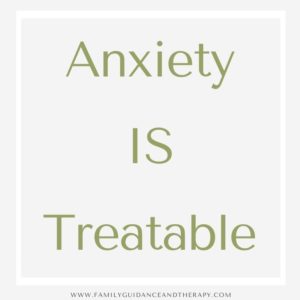What is Anxiety?
Anxiety is a tough emotional experience. Most of us can recall a recent event where we’ve felt mild forms of anxiety, the type that alerts you that you left the fridge door open. It’s immediate and often ends quickly.
We’ve felt more pressing anxiety when we rush to complete a deadline at work.
Anxiety is the body’s natural alarm clock that can signal action. But when that alarm clock is blaring all day long or at an intensity that is paralyzing or distressing; it’s time to get help.
Anxiety in Teens
Our teens may express anxiety differently than the average adult. Teens may have the classic symptoms of persistent thoughts, fear of engagement or heart palpitations.
Many times teens experience anxiety in ways that we may pass off as “being a teen.” Teens may experience debilitating anxiety and not know that those physiological symptoms are in fact anxiety; so they may not alert you to their symptoms.
You may notice your teen being irritable, closing themselves off to family members, or avoiding school work. At first glance these things sound like any average teenager. Yet, sometimes it’s best to dig into exactly what’s going on and not just brush it off as a passing stage.
Anxiety is hard to live with. If you suspect your child is struggling with high stress, worry, or symptoms of anxiety, the following is a guided conversation to help you and your teen talk about anxiety. It is not a script, so personalize it by making it your own.
Tips For Your Anxious Teen
Don't have teens yet? Here are tips for children struggling with anxiety
Ask questions.
- Where do you feel your anxiety in your body? Don’t settle for “everywhere” or “I don’t know.” Guide your child to sort through where anxiety lives in his body (clenched jaw, raised shoulders, clenched fists, tight chest, palpitations in chest, back of the throat, stomach pain).
- What do you notice about your anxiety such as the time of day or situations that often produce anxiety?
- What do your thoughts say when you are feeling anxious? Are the thoughts critical? (“Stop being a P***y.”), Are they unrealistic? (“Man up and face your fears). Do the thoughts have cognitive distortions? (“I’m the worst. I’ll never get this.”). Are they self-defeating (“I’m the only one that is this crazy.”) or are they kind, gentle and encouraging?
- What active things do you do when you feel anxiety? (Examples: distract through phone use, listen to music, eat, exercise, pick at skin, pace around). Get your kid talking about anything he does when feeling anxious. Write these down for him. Ask him to review the list and circle the actions that are effective at lessening anxiety. If no actions are circled, normalize that by saying something like, “That makes sense. Most of us don’t totally know how to tame anxiety. I have some thoughts I’ll share later, if you are interested.”
- How do you know when the anxiety has gone away?
- What do you think about people that are anxious or have anxiety? Do you have judgments about yourself because you have anxiety?
- How much does your anxiety bother you? Have him scale this from 1 (not really a problem) -10 (a very big problem in my life)
- Is there anything else on your mind that you’d like to share with me?
- Would you be interested in exploring some ideas to help you sort through your anxiety?
Only if you have a yes, in question 9 is it the time to explore solutions. If your child says “no,” respect that boundary and say, “Thank you for letting me in to the things that are on your mind, I’d like to think about all that you shared and chat later; maybe in a few days.” Honor the time limit that you set.
Explore Interventions.
Teens are told what to do and when to do it all day, every day. If you come at anxiety intervention by telling your child what to do you are probably going to get the same shutdown or reactivity you experience when you tell him to do his homework.
Exploring ideas has to be a real curiosity of if something will work. If we model genuine curiosity for our children when they are struggling, we help them open their hearts to support.
Wearable solutions:
- Apollo wrist watch: https://apolloneuro.com/
- Komuso necklace to “Slow your breath, relieve anxiety, with style.” https://www.komusodesign.com//products/women-b?variant=31432720613433&ab_version=A&gclid=EAIaIQobChMI2L_czpb87gIVUvHACh21gwAwEAQYASABEgLYFfD_BwE
- Fidget/Spinner/Anxiety rings: https://www.etsy.com/listing/705631879/fidget-ring-anxiety-ring-worry-ring?gpla=1&gao=1&&utm_source=google&utm_medium=cpc&utm_campaign=shopping_us_b-jewelry-rings-bands&utm_custom1=_k_EAIaIQobChMIiZuZj5f87gIVB7zACh0rtQB2EAQYBSABEgKhkfD_BwE_k_&utm_content=go_1731463806_66599843406_337603372774_pla-311089096269_c__705631879_190815955&utm_custom2=1731463806&gclid=EAIaIQobChMIiZuZj5f87gIVB7zACh0rtQB2EAQYBSABEgKhkfD_BwE
- Diffuser necklaces: https://www.vitalityextracts.com/collections/diffuser-necklaces?gclid=EAIaIQobChMIruzRrJf87gIVSFXVCh1jRQmDEAAYAiAAEgJ8F_D_BwE
Environmental Supports:
- Weighted blanket: https://www.lunablanket.com/products/luna-weighted-blanket?variant=33465336791128&gclid=EAIaIQobChMI34mL2Jf87gIVl4rICh2CkwDOEAAYASAAEgJcRfD_BwE
- Fidget boxes: https://www.positivepromotions.com/stress-relief-kit/p/osw9417/?gclid=EAIaIQobChMI7Oba55f87gIVksDACh0YjAQrEAQYAyABEgLLSPD_BwE
- Time with animals. Animals from dogs to lizards to guinea pigs have a soothing quality when anxious and as a proactive strategy.
- Vitamin D. The sun and having sunlight on our bodies as well as having our eyes experience sunny light is very helpful for natural improvements to mental health. If you don’t live in an area with access to daily sunlight, you can create it with products like this https://www.amazon.com/Verilux-HappyLight-Lucent-Bright-Therapy/dp/B079YBGPM5/?tag=dotdashvwm-20&ascsubtag=4172537%7Cn3a72106f909a49038b195f4621b0f9ef0
- Vitamin Sea. If you live by the ocean, vitamin Sea also has healing properties with the rhythm, sound, and full body sensory experience of the ocean. Get on that winter wetsuit and play in the waves.
Lifestyle changes:
- Sleep solutions such as Hatch: https://www.hatch.co/restore?url=https://ad.atdmt.com/c/img;adv=11212209045368;ec=11212209215519;c.a=10060062419;s.a=gdn;p.a=10060062419;a.a=10060062419;cache=3735128832549759008;qpb=1;?h=https://www.hatch.co/restore&gclid=EAIaIQobChMI6OSt_Zf87gIVxkXVCh2siAJPEAYYCCABEgK8WPD_BwE
- Vigorous exercise daily will support anxiety reduction. Encourage exercise before sundown, as it could alert the body too late. Think trampoline, punching bag, or good ole fashion running.
- Guided Journaling, not just a basic diary. Teens will often write down things that sustain their anxiety and self-defeating thoughts if they don’t have a guided journal that targets the development of new and healthy thoughts https://biglifejournal.com/products/big-life-journal-teen-edition?variant=9183894175780&utm_medium=cpc&utm_source=google&utm_campaign=Google%20Shopping¤cy=USD&wickedsource=google&wickedid=EAIaIQobChMI1de-1pj87gIVUPHACh1a_QxbEAYYASABEgJ9DPD_BwE&wv=3&gclid=EAIaIQobChMI1de-1pj87gIVUPHACh1a_QxbEAYYASABEgJ9DPD_BwE
- Planned alone time. Teens spend a lot of time alone, but sometimes teens need helping to make alone time be restful and restorative. Assure teens that they can have their space free from siblings and that you will support them to find a quiet and restful place. Encourage the use of music, and maybe even mindless games such as Words with Friends.
Share Experiences Without Minimizing Theirs
The common adage of “you don’t understand” is nothing to debate. We don’t understand what it’s like to be a teen these days, we have never been a teen with access to Tik Tok, Instagram, and all the apps that we are too old to even know about.
We don’t understand what it’s like to be a teen in a pandemic. And this is a very good starting point. Share with your child that you “don’t totally understand what it’s like to be a teen today” and that you are open to “hearing about the struggles that he is facing”. If he opens up, don’t say “That happened to me too.” Validate his struggles. Say “That sounds really tough.”
When offering your own experiences, be sure to find out if they are interested in hearing about it. This may sound like, “I’ve been through something similar. I can share what it was like for me and what I did, if you’d like.”
Find time for Connection.
Even though your teen may not count you as his top priority in the social hierarchy, having caregivers that carve out time to show their teens that they deliberately care for them is an effective strategy regardless of what your child is going through.
This does not need to be a big overture like “Son, we need to spend some quality time together” where your teen rolls their eyes and gets back to texting. The pre-planning of alone and connected time is your job.
It can be as simple as finding time to go to a favorite restaurant without any tag-along siblings. It can be spending 20 minutes learning his favorite video game and playing it with him. “Grand Theft Auto can’t be that hard, right?”. It may be going “all in” on listening to him talk about his favorite hobbies and sharing positive feedback about his knowledge base (without connecting it to future action or careers).
Maybe you dust off the nerf guns and have a little playful fun like the good ole days. It may even be sitting without talking and watching their favorite movie. Showing children in a way that feels connecting for them is the only goal of this time.
Call in support.
Sometimes we are out-gamed and a problem is not a ‘go it alone’ event. This may be a time where you explore bringing in supportive professionals such as a therapist, psychiatrist, and his educational team.
Often teens don’t want the spotlight of all this support and we have to acknowledge the cultural expectations that asking for help has in this world.
What I can share is that sometimes having an impartial person in your child’s life that is just for them and their needs can be healing in and of itself. Sometimes parents aren’t the best people to talk to and sometimes we are part of the problem.
In the teenage years, it's often best practice to let your teen attend therapy by themselves and as autonomously as possible. This can be scary at first for parents because it may feel like you are losing control or even that your child might paint you as the bad guy. Generally, a good therapist understands that the narrative that is shared is not the definitive truth and will guide away from blame and anger.
But it’s also important for you to get the care you need; so finding a therapist for yourself may also help. You may be contributing to your child’s anxiety and not know it. You may also find that the resources online are fully effective in helping you understand anxiety, what your teen is going through, and ways to support him.
Need tips for yourself? Here are some things that you can do (or stop doing) to ease anxiety in your life
Should you medicate?
Most parents find themselves in the medication debate; “should we or shouldn’t we.” For many parents, if they don’t have personal experiences with the benefits of psychotropic medication, they will fall on the side of “everything else” first and medication becomes a final solution.
For me, I see anxiety medications as highly effective at providing working space to develop skills and strategies of coping. I see the high costs of minimizing the role of effective medicine. When we share with our teens the belief symptom that medication is a last resort, we strengthen their worthlessness when medication becomes an answer.
When we bring biases about psychotropic medications, we further the stigma of treating mental health issues as we would treat physical health issues. Finally and most importantly, when we wait until our child is experiencing significant symptoms and their life is more fully affected by the issues they are facing, the waiting period of three weeks to therapeutic dose may seem way too long.
Medication often requires some trial and error and we all have to go into these conversations with this idea firmly understood. If one medication does fit your child, it does not mean that medication doesn’t work. It means that more exploration is needed.
Vitamins and supplements may also work to support your child, but a few vitamins ordered off of Amazon is likely not going to be the answer. When developing a medication, supplement and dietary supports for anxiety, always consult an expert. Internal medicine physicians, naturopaths, and psychiatrists will offer a treatment plan that includes several options and solutions.
Medication doesn’t have to be an answer for every family, but it certainly is part of a well-rounded treatment plan for anxiety.
Adding professionals to support your child’s emotional health and wellness is just another way to show up for your kid.
Resolve underlying issues.
A teen will often have a way of describing what is going on for them that is based in the present and what just happened. Sometimes these stories are clinically called ‘red herring’ or a misleading clue. They often make sense. They often are passionately told, but they may not be the underlying issues.
When looking at the underlying causes of anxiety disorders, examine past or chronic personalized traumas, past and current support systems, any recent loss or change including life transitions, social connection and perceived social status, undiagnosed or under-supported educational needs. Sometimes these underlying factors, if left unattended, will make the symptoms of anxiety hard to mitigate.
Treat the root cause or causes as well as the symptoms.
Do whatever it takes.
Do whatever it takes to elevate these symptoms, create healthy coping skills and change the body’s physiological responses to anxiety. There are millions of ways to be a great parent and supporting their mental health and wellness is always on the list.
If your child experiences anxiety and you’d like to have him meet with a therapist, call 619-600-0683 ext 1. We have both virtual and face-to-face sessions available for your child. We can also support you in helping your teen by refining your parenting approach.


